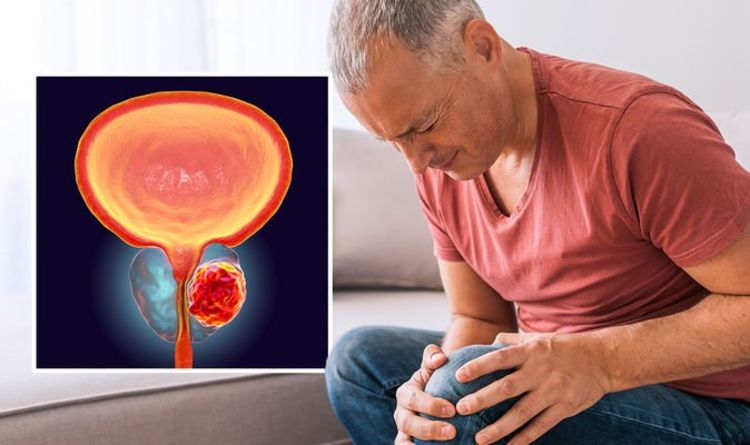Cancer symptoms: Top 14 early signs to look out for
We use your sign-up to provide content in ways you’ve consented to and to improve our understanding of you. This may include adverts from us and 3rd parties based on our understanding. You can unsubscribe at any time. More info
Prostate cancer is the most common cancer in men in the UK. It is more common over the age 65. According to the NHS, prostate cancer usually progresses very slowly, you can live for decades without symptoms. As a result, you may not detect it until it has spread to other regions.
According to Macmillan Cancer Support, if the bones in the spine have cancer in them, the cancer may press on the spinal cord. This is called spinal cord compression.
It usually affects your legs and may cause numbness or tingling in your legs, says the charity.
“If you notice these symptoms, you should contact your doctors straight away – even at the weekend or during a holiday period,” it advises.
“If you cannot contact your GP or cancer doctor, you should go to the nearest emergency department (A&E).”

General symptoms include:
- Needing to pee more frequently, often during the night
- Needing to rush to the toilet
- Difficulty in starting to pee (hesitancy)
- Straining or taking a long time while peeing
- Weak flow
- Feeling that your bladder has not emptied fully
- Blood in urine or blood in semen.
These symptoms do not always mean you have prostate cancer.
The NHS explains: “Many men’s prostates get larger as they get older because of a non-cancerous condition called benign prostate enlargement.”
Nonetheless, “if you have symptoms that could be caused by prostate cancer, you should visit a GP”, advises the health body.
DON’T MISS
Visceral fat: The warm drink that decreases belly fat ‘significantly’ [TIPS]
Cancer: The warning sign when you wake up in the morning [INSIGHT]
Supplements: The ‘healthy’ supplement causing liver injuries [ADVICE]
As it explains, the GP will discuss the pros and cons of the various tests with you to try to avoid unnecessary anxiety.
Am I at risk?
It’s not known exactly what causes prostate cancer, although a number of things can increase your risk of developing the condition.
Anything that can increase your risk is called a risk factor. But having a risk factor doesn’t mean that you will definitely develop prostate cancer.
Your risk of developing it depends on many things. These include age and ethnicity.

Cancer Research UK explains: “Prostate cancer is more common in older men. Prostate cancer is most common in men aged 75 to 79 years.”
According to the charity, prostate cancer is more common in black-African men than white men. It is least common in Asian men.
“Your risk of prostate cancer is higher if you have a close relative, such as a brother or father, who has had prostate cancer,” says the health body.
“Some inherited genes can increase your risk of prostate cancer. These inherited genes are rare and account for only a small number of prostate cancers.”

There are also a number of risk factors you can modify, namely through your diet.
Research is ongoing into the links between diet and prostate cancer, and there is some evidence that a diet high in calcium is linked to an increased risk of developing prostate cancer
A linked factor is obesity. Recent research suggests there may be a link between obesity and prostate cancer, and a balanced diet and regular exercise may lower your risk of developing prostate cancer.
Source: Read Full Article
